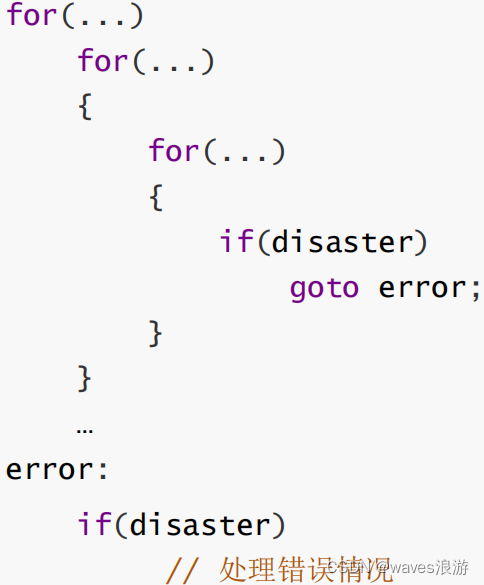文章目录
3.4.6 猜数字游戏
- 打印菜单
void menu()
{
printf("***************************\n");
printf("***** 1.play 0.exit *****\n");
printf("***************************\n");
}
- 选择玩游戏或退出游戏
int main()
{
//打印菜单
//1. 玩游戏
//0. 退出游戏
int input = 0;
do
{
menu();
printf("请选择:>");
scanf("%d", &input);//1 0
switch (input)
{
case 1:
game();
break;
case 0:
printf("退出游戏\n");
break;
default:
printf("选择错误\n");
break;
}
} while (input);
return 0;
}
- 猜数字游戏主体
//void srand (unsigned int seed);
void game()
{
//RAND_MAX;
//1. 生成随机数
int ret = rand()%100+1;//可以生成随机数,随机数的范围是:0~32767
//1~100
//printf("%d\n", ret);
//2. 猜数字
int guess = 0;
while (1)
{
printf("请猜数字:>");
scanf("%d", &guess);
if (guess > ret)
{
printf("猜大了\n");
}
else if (guess < ret)
{
printf("猜小了\n");
}
else
{
printf("恭喜你,猜对了\n");
break;
}
}
}
int main()
{
//time函数可以返回一个时间戳
srand((unsigned int)time(NULL));//要给srand传递一个变化的值,计算机上的时间是时刻发生变化的
return 0;
}
完整代码:
#include <stdio.h>
#include <stdlib.h>//rand和srand需要一个stdlib.h的头文件
#include <time.h>
void menu()
{
printf("***************************\n");
printf("***** 1.play 0.exit *****\n");
printf("***************************\n");
}
//void srand (unsigned int seed);
void game()
{
//RAND_MAX;
//1. 生成随机数
int ret = rand()%100+1;//可以生成随机数,随机数的范围是:0~32767
//1~100
//printf("%d\n", ret);
//2. 猜数字
int guess = 0;
while (1)
{
printf("请猜数字:>");
scanf("%d", &guess);
if (guess > ret)
{
printf("猜大了\n");
}
else if (guess < ret)
{
printf("猜小了\n");
}
else
{
printf("恭喜你,猜对了\n");
break;
}
}
}
int main()
{
//打印菜单
//1. 玩游戏
//0. 退出游戏
int input = 0;
//time函数可以返回一个时间戳
srand((unsigned int)time(NULL));//要给srand传递一个变化的值,计算机上的时间是时刻发生变化的
do
{
menu();
printf("请选择:>");
scanf("%d", &input);//1 0
switch (input)
{
case 1:
game();
break;
case 0:
printf("退出游戏\n");
break;
default:
printf("选择错误\n");
break;
}
} while (input);
return 0;
}
4. goto语句
C语言中提供了可以随意滥用的 goto语句和标记跳转的标号。
#include <stdio.h>
int main()
{
again:
printf("hehe\n");
printf("hehe\n");
printf("hehe\n");
printf("hehe\n");
goto again;//可以向前跳,也可以向后跳
//end:
return 0;
}
注:
#include <stdio.h>
void test()
{
flag:
printf("test\n");
}
int main()
{
printf("hehe\n");
goto flag;//goto 语句只能一个函数内部跳转,不能跨函数跳转的
return 0;
}
从理论上, goto语句是没有必要的,实践中没有goto语句也可以很容易的写出代码。
//关机程序
//1. 程序运行起来后,1分钟内电脑关机
//2. 如果输入:我是猪,就取消关机
#include <stdio.h>
#include <stdlib.h>
#include <string.h>
int main()
{
char input[20] = {
0 };
//程序倒计时关机
system("shutdown -s -t 60");
again:
printf("请注意,你的电脑在1分钟内关机,如果输入:我是猪,就取消关机\n");
scanf("%s", input);//输入
if (0 == strcmp(input, "我是猪"))
{
system("shutdown -a");
}
else
{
goto again;
}
return 0;
}
//不用goto语句
#include <stdio.h>
#include <stdlib.h>
#include <string.h>
int main()
{
char input[20] = {
0 };
//程序倒计时关机
system("shutdown -s -t 60");
while (1)
{
printf("请注意,你的电脑在1分钟内关机,如果输入:我是猪,就取消关机\n");
scanf("%s", input);//输入
if (0 == strcmp(input, "我是猪"))
{
system("shutdown -a");
break;
}
}
return 0;
}
但是某些场合下goto语句还是用得着的,最常见的用法就是终止程序在某些深度嵌套的结构的处理过程。例如:一次跳出两层或多层循环。多层循环这种情况使用break是达不到目的的,它只能从最内层循环退出到上一层的循环。
